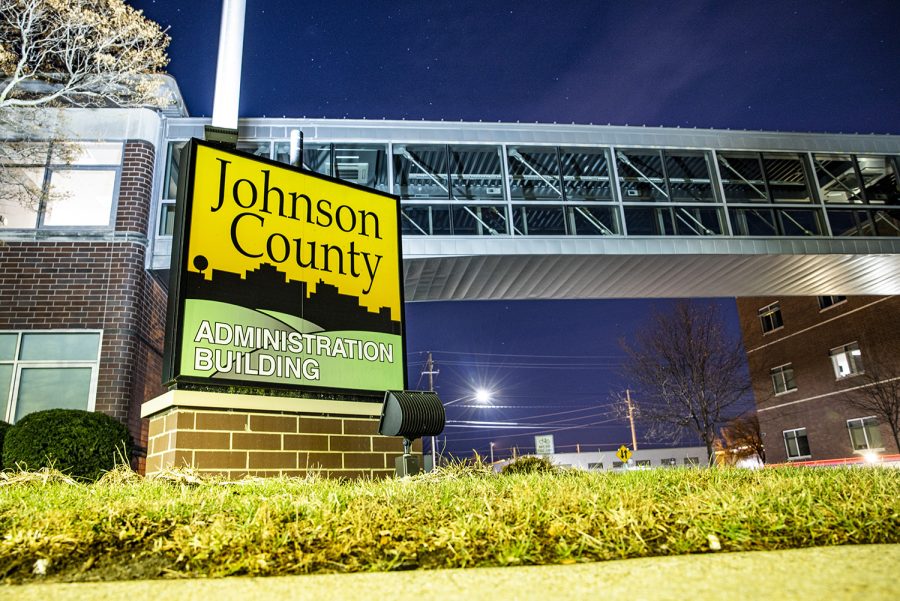Johnson County law enforcement hires mental health liaison
Kieonna Pope will work with the agencies to respond to calls where there are signs of mental health crisis and distress.
The Johnson County Administration Building is seen on South Dubuque Street in Iowa City on Sunday, Nov. 27, 2022.
November 27, 2022
Johnson County law enforcement will now be equipped with a mental health expert to assist in emergency situations.
Mental health liaison Kieonna Pope will work with the Johnson County Sheriff’s Office, the Coralville Police Department, and the North Liberty Police Department as a shared mental health liaison.
The position is a collaboration between the agencies and CommUnity Crisis Services — where Pope is employed. The collaboration was announced in a press release from the City of North Liberty on Nov. 7.
Pope will work with the agencies to respond to calls where there are signs of a mental health crisis and distress, the press release stated.
“The partnership will focus on providing increased access to mental health resources, diversion from hospitalization and jail, and other treatment services for individuals with mental illness or co-occurring mental health and substance abuse disorders,” the release states.
Pope will work out of the North Liberty Police Department and will be in contact with the other two agencies through phone and email.
Johnson County Sheriff Brad Kunkel said having one person across the three agencies will allow them to test the demand for the position in the area.
“This is brand-new, so obviously we don’t know what the appropriate workload is for one person,” he said. “We will continually monitor and evaluate the program as it develops over the next year. It’s certainly possible that each agency could have its own liaison someday.”
Kunkel said the position is funded by the East-Central Region’s Disabled Mental Health Services, a government agency that receives funding from the state to serve the mental health needs of nine counties. After the first four years, the three departments will fund the position themselves.
RELATED: Joachim Seelos joins Iowa City Police Department as mental health liaison
Kunkel said there are two main reasons for bringing a mental health liaison into the agencies.
“It’s yet another effort by local law enforcement to connect people in crisis with appropriate resources and provide better outcomes over the long term,” he said. “Second, we are looking to reduce the amount of contact law enforcement has with persons who really don’t need a law enforcement response.”
Johnson County, Coralville, and North Liberty are not the first police agencies to bring on a mental health liaison. Over the past five years, the role has been implemented in the Cedar Rapids, Ottumwa, and Iowa City departments.
Kunkel said the three departments gave advice about adding a mental health liaison into his department.
“I think the most important piece of advice I’ve received is making sure the right person is selected for the position,” he said. “The key to success is making sure we have the right person for the job.”
Joachim Seelos, Iowa City Police Department mental health liaison, was brought into the department in 2021.
Iowa City Police Department Sgt. Andrew McKnight said having a mental health liaison has benefited the department.
“One of the biggest impacts that [Seelos] has had on our department is the increased ability to provide strong follow-up services to the people that he engages with,” he said. “He is able to communicate with his clients after their crisis and then guide them to the appropriate level of service based on the types of things that are going on in their lives.”
Seelos responded to 11 mental health calls on Nov. 16, McKnight said. He said the response of a mental health professional, rather than a uniformed police officer, helped with de-escalation at the scene of calls.
At the Iowa City Police Department, Seelos responds to calls that are determined to have no threat of criminality, McKnight said.
“Let’s just say we’re dealing with a call on behalf of a student or friend who articulated on Facebook that they were depressed and considering suicide,” he said. “If we can ascertain that there are no weapons and there is no threat, it is an opportunity for the public to receive a response to a mental health crisis without police involvement.”



